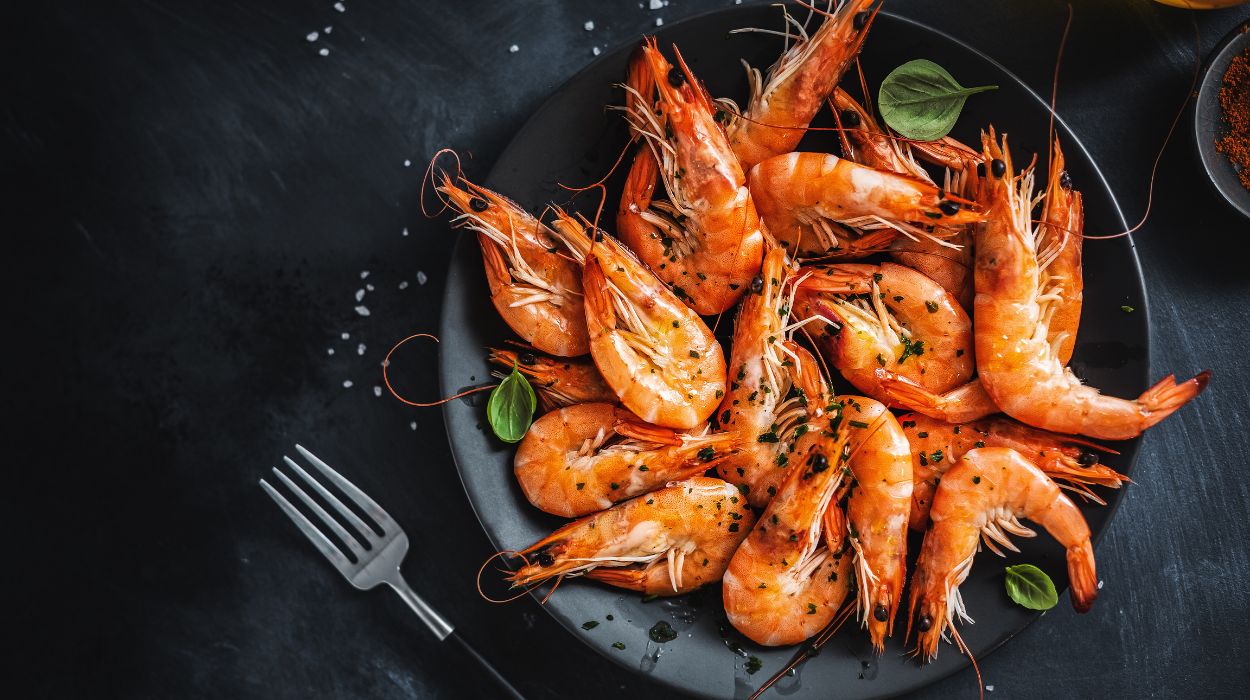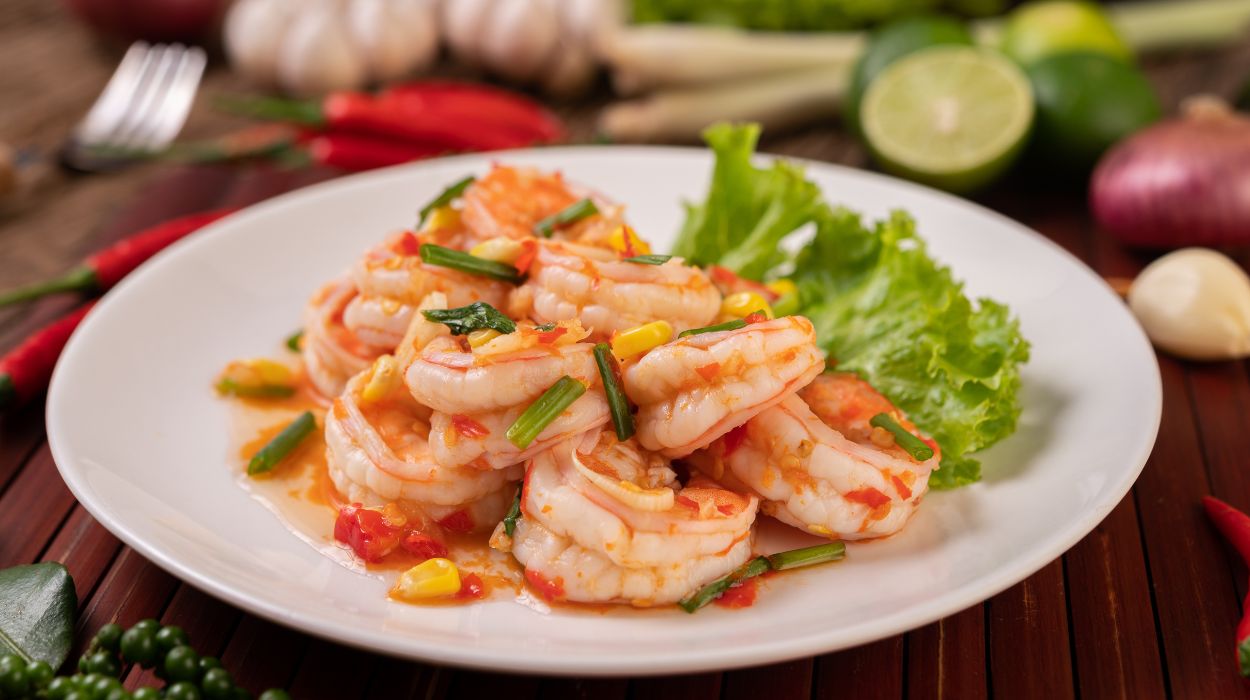 Expert's opinion
Expert's opinion
Expert's opinion
The article is a subjective view on this topic written by writers specializing in medical writing.
It may reflect on a personal journey surrounding struggles with an illness or medical condition, involve product comparisons, diet considerations, or other health-related opinions.
Although the view is entirely that of the writer, it is based on academic experiences and scientific research they have conducted; it is fact-checked by a team of degreed medical experts, and validated by sources attached to the article.
The numbers in parenthesis (1,2,3) will take you to clickable links to related scientific papers.
Can Pregnant Women Eat Shrimp? Is It Safe For Expectant Mothers In 2024?

When you become pregnant, cravings for certain foods increase. This is due to the hormonal changes that occur upon conception, which may create a longing for particular kinds of food, some with peculiar tastes. Your main goal is likely to continue eating healthy in this stage. One common question appears, “Can pregnant women eat seafood while pregnant?” So how safe is the continuance of shrimp and seafood consumption during pregnancy?
Can You Eat Shrimp While Pregnant?
The answer is yes.
Luckily, during pregnancy, shrimp can be a great source of key nutrients such as zinc, iron, protein, and omega-3 fatty acids, which are vital for the baby’s development. However, there have long been concerns about pregnant women eating seafood, especially raw seafood, because of the risk of foodborne illness or heavy metal toxicity.
Can Pregnant Women Eat Shrimp?
Many expectant mothers wonder “Can I eat shrimp while pregnant?” and may have the only thing that comes to mind when you hear the word “shrimp”, there are many things that are categorized under the name. A few of these are barnacles, copepods, crabs, lobsters, crayfish, and barnacles.
Because of their impressive nutrient composition and abundance, millions of people regularly consume shrimp all over the world. Whether you are making a homecooked meal or ordering at a restaurant, you may wonder if you can eat seafood while pregnant and if you can eat shrimp cocktails while pregnant.
Larger seafood sources like sharks, tilefish, king mackerel, or swordfish can contain high levels of mercury.[1] This metal may pose little risk to the adult in moderation, but special care needs to be applied to a woman who is already pregnant or intends to be. Research has shown that mercury can accumulate in your bloodstream over time if certain types of seafood are consumed regularly. Excess mercury in the woman’s body can impede the child’s brain and nervous system development resulting in a delay of the newborn’s/infant’s/toddler’s developmental milestones and even more devastating neurologic milestones.
Is shrimp safe during pregnancy? While it is essential to be cautious about seafood consumption in general during pregnancy, it is crucial to note that shrimps do not need to be in this feared category. This is because it contains low levels of mercury compared to many other types of seafood. In fact, there are benefits to all seafood low in mercury, such as improved neurodevelopment, reduced risk of preterm birth/prematurity, and possible reduction of preeclampsia and childhood allergies. Most of these benefits are due to the rich source of omega-3 fatty acids.
While it has been decided that shrimp is safe for women to eat while pregnant, you will be happy to hear that it also provides extra nutrition for pregnant women. This means there are some surprising benefits for your health to be enjoyed! Shrimp contains low levels of fat and higher amounts of protein, making them a healthy choice for pregnant women.
Health Benefits Of Eating Shrimp During Pregnancy

- Eating shrimp during pregnancy increases the woman’s intake of Omega 3 fatty acids, amino acids, and other nutrients; this positively affects the child’s birth weight due to better nutrition and a reduced risk[2] of premature birth.
- Due to shrimp being so high in omega-3 fatty acids, the food can help improve heart health. This happens when the fatty acids increase your high-density lipoprotein (HDL) levels and lower your low-density lipoprotein (LDL) levels. HDL is the good cholesterol, and LDL is the bad cholesterol.
- Shrimp is normally high in selenium and contains important nutrients for pregnancy, such as vitamin B12, iron, iodine, choline, phosphorus, and copper.
- When a pregnant woman consumes shrimp often, she is likely to experience a lowered risk of high blood pressure and atherosclerosis.
- There are minerals found in shrimp that promote healthy teeth and bones, and also a protected immune system.
- The consumption of seafood and shrimp also positively correlates with the circumference of the baby’s head.
- An increased intake of shrimp and or other sources of low mercury-containing seafood during pregnancy may reduce the incidence of eczema[3] and asthma in children.
- Studies show that increased intake of high mercury-containing fish, like shellfish, during pregnancy increases the risk of food allergy[4] in children. Since shrimp do not contain high levels of mercury, their consumption may reduce the risk of childhood allergies by replacing other high-mercury seafood in the diet.
- Research shows that intake of shrimp or low mercury-containing seafood during pregnancy reduces the need for a prolonged hospitalization of the baby upon birth (less risk of prematurity) and reduces the number of pain crises in sickle cell[5] children.
- Omega-3 intake also reduces the possibility of inflammatory bowel disease flares in children.
Recommendations For Eating Seafood During Pregnancy

It is said that the heart wants what the heart wants. As true as this statement is, pregnant women must begin to consider not only what the heart wants but what the stomach needs! Pregnant women or women of childbearing age must consider what the growing child in her womb needs rather than only what she craves to eat. As much as she enjoys seafood, she must ask questions like “What amount of seafood is okay during pregnancy,” or “Can I eat shrimp cocktails while pregnant?”
Mercury And Omega-3 Fatty Acid Content
From our study, we see that the safety of seafood is dependent on the levels of mercury and the omega-3 fats it contains. The Food and Drug Administration (FDA) and the Environmental Protection Agency (EPA) recommend that a woman who is pregnant sticks to about eight ounces (up to 12 ounces) of low mercury-containing seafood per week. That’s about two to three 3-4 ounce meals per week.
Seafood Should Be Cooked Properly
As much as shrimp is safe for consumption by pregnant women, it is of vital importance to consume only well-cooked shrimp. For optimal safety, it should be cooked to a temperature around 65 to 70 degrees Celsius (145 degrees Fahrenheit). Eating fish below this or eating raw shrimp such as sashimi and sushi may be detrimental to the development of the fetus. Raw or undercooked shrimp may pose the same concerns, and as nice as it may taste, it’s best to stick to fully cooked shrimp when pregnant.
Find Seafood Source
It’s also important to be aware of where the shrimp is sourced from, as the mercury content of seafood may vary depending on the source. Local health departments should have records of the mercury content of the water bodies in your area and if the amount is considered safe. Locally harvested shrimp can often be safely eaten if well-cooked.
It is strongly recommended that pregnant women seek local advice to know the source of their shrimp before consumption. If the source is unknown, try reducing the amount you eat from around eight ounces a week to six ounces to play it safe.
No Large Fish Consumption
Large predatory fish like sharks contain higher levels of mercury, making it inadvisable for the pregnant woman. As mentioned before, smaller types of seafood like shrimp are great for meals during pregnancy. Others include salmon, anchovies, herring, sardines, tilapia, pollock, and Pacific mackerel.
Any of these can serve as safer types of seafood for the pregnant woman as they contain the seafood requirements in the right proportion – that is, lower levels of mercury and higher levels of beneficial omega-3 fatty acids.
The Bottom Line
Eating shrimp and other forms of seafood is great for the body under normal circumstances. The negative effects, if any, can be overlooked by the average adult, but a problem arises when an adult is pregnant. Also, seafood is a good source of iodine, which is needed for the synthesis of thyroid hormones. When deficient, not only does the pregnant woman risk hypothyroidism but there could be severe harm[6] to the fetal nervous system, whose maturity is dependent on the mother’s thyroid hormone. Alternatively, in areas or diets without seafood, iodized salt can be used.
As much as a pregnant woman may have cravings for her usual delicacies, the diet may need to be modified to ensure the optimal safety of the growing fetus. Therefore certain foods may need to be prioritized over others during this critical time.
Different types of seafood contain mercury in varying amounts. While a small amount of mercury is harmless to the body, it can be detrimental to the fetus if consumed in excess. Shrimp contains low levels of mercury, making it safe for consumption by pregnant women at 8-12 ounces per week. Among other nutrients essential for the child’s development, it contains omega-3 fatty acids that contribute greatly to the child’s development.
For safer consumption of shrimp and other forms of seafood, certain factors must be considered. These include how well-cooked the shrimp is, the source, and local directories that advise of local conditions. Raw and undercooked shrimp may contain some amounts of potentially harmful bacteria that can cause a foodborne infection or even marine toxins.
When the source of the seafood is unknown, the food can still be eaten, but it is not generally advised during pregnancy. Always consult with your dietitian, medical doctor, or obstetrician for individual guidance on a safe diet when pregnant or trying to conceive to ensure the best possible health status for your little one.
+ 6 sources
Health Canal avoids using tertiary references. We have strict sourcing guidelines and rely on peer-reviewed studies, academic researches from medical associations and institutions. To ensure the accuracy of articles in Health Canal, you can read more about the editorial process here
- Center (2022). Mercury Levels in Commercial Fish and Shellfish (1990-2012). [online] U.S. Food and Drug Administration. Available at: https://www.fda.gov/food/metals-and-your-food/mercury-levels-commercial-fish-and-shellfish-1990-2012
- Middleton, P., Gomersall, J.C., Gould, J.F., Shepherd, E., Olsen, S.F. and Makrides, M. (2018). Omega-3 fatty acid addition during pregnancy. Cochrane Database of Systematic Reviews, [online] 2018(11). doi:10.1002/14651858.cd003402.pub3.
- Miles, E. and Calder, P. (2017). Can Early Omega-3 Fatty Acid Exposure Reduce Risk of Childhood Allergic Disease? Nutrients, [online] 9(7), p.784. doi:10.3390/nu9070784.
- Pelé, F., Bajeux, E., Gendron, H., Monfort, C., Rouget, F., Multigner, L., Viel, J.-F. and Cordier, S. (2013). Maternal fish and shellfish consumption and wheeze, eczema and food allergy at age two: a prospective cohort study in Brittany, France. Environmental Health, [online] 12(1). doi:10.1186/1476-069x-12-102.
- Bernstein, A.S., Oken, E., de Ferranti, S., Lowry, J.A., Ahdoot, S., Baum, C.R., Bole, A., Byron, L.G., Landrigan, P.J., Marcus, S.M., Pacheco, S.E., Spanier, A.J., Woolf, A., Abrams, S.A., Fuchs, G.J., Kim, J.H., Lindsey, C.W., Magge, S.N., Rome, E.S. and Schwarzenberg, S.J. (2019). Fish, Shellfish, and Children’s Health: An Assessment of Benefits, Risks, and Sustainability. Pediatrics, [online] 143(6). doi:10.1542/peds.2019-0999.
- Europe PMC (2016). Europe PMC. [online] Europepmc.org. Available at: https://europepmc.org/article/med/9920376



